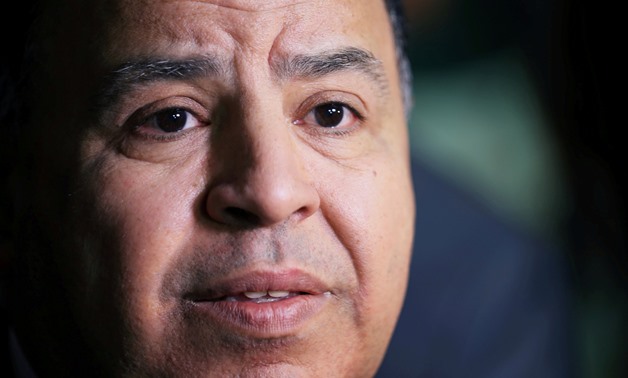
FILE PHOTO: Finance Minister Mohamed Maait speaks during a news conference in Cairo, Egypt July 5, 2018. REUTERS/Mohamed Abd El Ghany/File Photo
CAIRO - 9 December 2019: "Egypt’s economic reform program recorded positive results that are praised by international institutions, as the budget deficit decreased from 16.5 percent in 2014 to 8.2 percent in 2019," Finance Minister Mohamed Ma’it said Sunday.
"An initial surplus of 2 percent of GDP was achieved in 2019 instead of a primary deficit of 8.4 percent in 2014," the minister continued.
Ma’it added that the unemployment rate fell from 13.3 percent to 7.5%, and the inflation rate from 36 percent to 3.4 percent, while the growth rate increased from 4.4 to 5.6 percent. “We are targeting a growth rate of 7 percent by 2022."The foreign currency cash reserves have jumped from $12 billion in 2014 to more than $ 45 billion currently,” he revealed.
This came in the minister's speech delivered on behalf of Prime Minister Mustafa Madbouly during the annual Arab Banking Conference entitled “The implications of political fluctuations on the course of banking work.”
The minister explained that the economic reform program was based on raising the efficiency of public spending and rationalizing consumption and delivery of subsidies to those who deserve it through effective programs of protection and social support for the neediest groups. This is in addition to increasing spending on health and education from LE 115 billion in 2014 to LE 210 billion in 2019, and increasing food subsidies from LE 39.4 billion in 2014 to LE 87 billion in 2019.
He added that the largest social housing program in the world has been implemented for low and intermediate income people, where about 750,000 housing units have been delivered to their owners, explaining that the banking system is an original partner in implementing projects to support and improve the citizens' standard of living, as the central and commercial banks provided the necessary financing with a return reduced to 50 percent sometimes.
Ma’it pointed out that the stability of political conditions and economic growth are among the most important pillars of progress and development, and that it is not possible to achieve full political stability without a stable economy that is capable of providing the main needs and requirements of society, and ensures continuous improvement in the standard of living of citizens, and economic growth cannot be achieved without political stability.
He pointed out that political stability affects the economic situation of the country with its significant impact on investment decisions, whether for domestic or foreign investors; it also impacts the productivity and performance of individuals within the economic system, as political stability helps the state agencies perform their role and achieve their goals. He also stressed that the banking system plays a significant role because its tools affect the performance of projects, whether national, social or economic.

Comments
Leave a Comment